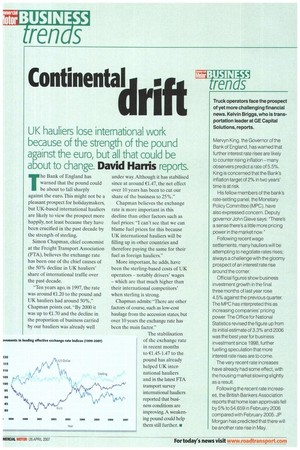d ri ft
Page 52

If you've noticed an error in this article please click here to report it so we can fix it.
unn
UK hauliers lose international work because of the strength of the pound against the euro, but all that could be about to change. David Hams reports.
The Bank of England has warned that the pound could be about to fall sharply against the euro. This might not be a pleasant prospect for holidaymakers, but UK-based international hauliers are likely to view the prospect more happily, not least because they have been crucified in the past decade by the strength of sterling.
Simon Chapman, chief economist at the Freight Transport Association (FTA), believes the exchange rate has been one of the chief causes of the 50% decline in UK hauliers' share of international traffic over the past decade.
"Ten years ago, in 1997, the rate was around E1.20 to the pound and UK hauliers had around 50%," Chapman points out. "By 2000 it was up to €1.70 and the decline in the proportion of business carried by our hauliers was already well under way. Although it has stabilised since at around €1.47. the net effect over 10 years has been to cut our share of the business to 25%."
Chapman believes the exchange rate is more important in this decline than other factors such as fuel prices: "I can't see that we can blame fuel prices for this because UK international hauliers will be filling up in other countries and therefore paying the same for their fuel as foreign hauliers."
More important, he adds, have been the sterling-based costs of UK operators — notably drivers' wages — which are that much higher than their international competitors' when sterling is strong.
Chapman admits: "There are other factors of course, such as low-cost haulage from the accession states, but over 10 years the exchange rate has been the main factor."
The stabilisation xvements in leading effective exchange rate indices (1999-2007) of the exchange rate in recent months to €1.45-1.47 to the pound has already helped UK international hauliers and in the latest FTA transport survey international hauliers reported that business conditions are improving. A weaken
120 115 110 105 100 95 90 85 80 US Doliar Sterling
3001 NO2 200 no4 2005 2000 ing pound could help them still further. •






















































































































































































